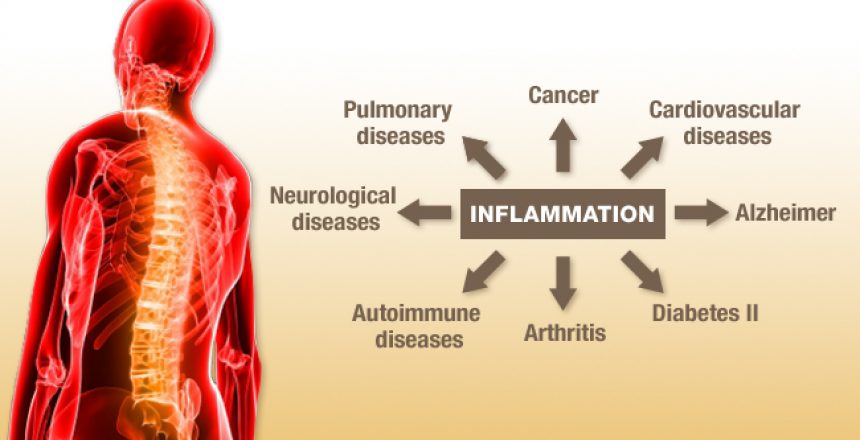Michael Maes, M.D., a Dutch biological psychiatrist who now works in Australia, has done much to establish the biological correlates of mental illness, especially depression, and has shown that inflammation and oxidative stress always accompany major depression.
Dr. Maes has also worked on the underpinnings of chronic fatigue syndrome (known as myalgic encephalitis in other parts of the English-speaking world), showing that it is “co-morbid’ with depression, that is, it shares many signs, symptoms, and underlying pathologies.
Depression is an inflammatory disease
Dr. Maes is co-author of a recent paper, So depression is an inflammatory disease, but where does the inflammation come from?
We now know that depression is associated with a chronic, low-grade inflammatory response and activation of cell-mediated immunity, as well as activation of the compensatory anti-inflammatory reflex system… The obvious question this poses is ‘what is the source of this chronic low-grade inflammation?’
A range of factors appear to increase the risk for the development of depression, and seem to be associated with systemic inflammation; these include psychosocial stressors, poor diet, physical inactivity, obesity, smoking, altered gut permeability, atopy, dental cares, sleep and vitamin D deficiency…
Most, but not all, of the above mentioned sources of inflammation may play a role in other psychiatric disorders, such as bipolar disorder, schizophrenia, autism and post-traumatic stress disorder.
The article goes on to discuss how these various factors raise levels of inflammatory cytokines as well as levels of oxidative stress.
Lifestyle factors that can be modified to prevent and treat depression
Of the ten factors listed above, at least eight are amenable to change and/or manipulation. (The two that are not, at least in part, are psychosocial stressors, particularly trauma or abuse in childhood, and atopy, or a tendency to be hyperallergic.)
Poor diet: the authors point out that a high glycemic index diet devoid of omega-3 fats and fruits and vegetables is associated with depression.
Fix: eat a diet low in refined carbohydrates, consider supplementing with fish oil, and eat your veggies.
Exercise: “There is a substantive evidence base on the role of exercise as an effective treatment strategy for depression.” The paper also notes that in older people, sarcopenia (muscle wasting) is related to systemic inflammation, and that resistance exercise ameliorates both sarcopenia and inflammation.
Fix: exercise regularly, especially resistance training.
Obesity: ” With few exceptions, both clinical- and community-based cross-sectional studies have consistently shown a relationship between obesity and depression regardless of methodological variability. … Obesity is an inflammatory state. Inflammatory cytokines have been found in abundance in fat cells, are involved in fat metabolism and have been observed to be positively associated with all indices of obesity, in particular abdominal obesity.”
Fix: lose weight and/or maintain the lean state.
Smoking: “Cigarette smoke contains many thousands of chemicals, including free radicals, metals, tars and other substances that induce inflammatory responses in bodily tissues and increase levels of O&NS.”
Fix: don’t smoke.
Gut permeability: “A new potential pathway that may mediate depression pathogenesis is increased immune responses against LPS [lipopolysaccharides] of different commensal, gram negative bacteria.” What this means is that increased gut permeability allows bacteria from the gut, or parts of their cell walls, into the rest of the body, where they are carried by the bloodstream everywhere. This causes an inflammatory response that may lead to depression. This phenomenon is important in chronic fatigue as well.
Fix: this is a bit more difficult, but will involve a better diet, probably of the low carb variety, high in saturated fats which will allow the gut to heal. Coconut oil is beneficial here. Supplements to be considered for this condition include n-acetylcysteine, probiotics, fish oil, and zinc.
Dental caries and periodontal disease: These are inflammatory, and gum disease is related to heart disease, as well as depression.
Fix: an easy one: take care of your teeth and gums.
Sleep: Insomnia is related to depression.
Fix: get a good night’s sleep. Use of blue-blocking glasses and/or melatonin may be helpful. Sleeping pills are bad news, and are related to a much higher risk of death.
Vitamin D deficiency: Vitamin D reduces markers of inflammation, and its deficiency is widespread.
Fix: get enough sun exposure, or supplement with vitamin D.
As we see, many factors associated with depression are quite modifiable, and lifestyle factors appear to play a large role in depression.
—————————————————————————————————————————————————
PS: If you need to lose weight and you want to save yourself years of poor results with bad information, I’ve put everything in a simple guide for you.
The World’s Simplest Fat-Loss Plan.











18 Comments
I just want to thank you for your work. This website is a fantastic resource.
I sincerely appreciate hearing that. It’s my pleasure.
I second that. Your twitter feed (and thus this website) has become a go to read for me.
Thanks.
I have to agree – always good advice found on this blog.
Thanks!
RE: Gut permeability… gelatin may be useful for that as well as a number of other inflammatory issues: https://chriskresser.com/5-reasons-why-even-vegetarians-need-gelatin
The only time I have a problem with depression is when I read your other blog.
Where is the RSS feed? With an RSS feed, roguehealthandfitness would pop up in my news aggregator, and I would not have to go looking for it. Studies have shown that being a big fat guy is highly correlated with laziness.
Here: https://pdmangan.com/feed/
Thank you, nightboat. Just what I was looking for.
There’s a software program that might help some. It’s called f.lux. Works like programmed blueblockers. It changes the screen on your computer to be more red and less blue at night. You can change the redness and timing.
https://justgetflux.com/
Any suggestions for dealing with atopy?
Omega-3 supplementation might be worth a try. Avoid omega-6 as well.
I love these articles connecting the dots… i.e. depression and other diseases so prevalent today connected to inflammation. I would only mention here that “take care of your teeth and gums” is a bit of an oversimplification. One thing I’ve learned and anecdotally observed in myself is that healthy teeth and gums comes from within. This was observed throughout Dr. Weston A. Price’s work outlined in Nutrition and Physical Degeneration, where cultures who didn’t have access to modern foods with highly refined flour and sugar didn’t have dental caries (cavities). I’ve noticed that I brush my teeth substantially less now than I used to, sometimes going days between brushing, with no cavities and very white teeth. My teeth have seemed to “remineralize” and become stronger, resisting staining for how much I like to drink tea, coffee and dark tannin-rich red wine. Teeth and gums are living organisms, so they respond to healthy interventions and reflect our bone health and the health of our gut flora very directly.
Thanks, Aaron. I agree. The fact that there’s a separate specialty, dentistry, for our teeth, and that everyone needs to have regular checkups and/or tooth repair, doesn’t seem to have made people notice the problem there.